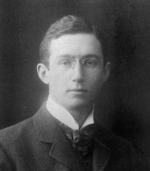Max Abraham facts for kids
Quick facts for kids
Max Abraham
|
|
|---|---|

Max Abraham
|
|
| Born | 26 March 1875 |
| Died | November 16, 1922 (aged 47) |
| Nationality | German |
| Known for | Abraham–Lorentz force Abraham–Minkowski controversy |
| Scientific career | |
| Fields | Physicist |
| Doctoral advisor | Max Planck |
Max Abraham (born March 26, 1875 – died November 16, 1922) was a German physicist. He was known for his important work on electromagnetism. This is the study of how electricity and magnetism are related. He also had different ideas about how the universe works compared to Albert Einstein's theory of relativity.
Contents
Max Abraham's Early Life and Studies
Max Abraham was born in Danzig, Germany, in 1875. This city is now called Gdańsk and is in Poland. He came from a family of merchants.
He went to the University of Berlin to study physics. There, he learned from a famous physicist named Max Planck. Max Abraham finished his studies in 1897. For the next three years, he worked as Max Planck's helper.
His Work on Electrons
From 1900 to 1909, Abraham worked at Göttingen University. He was a lecturer there. In 1902, Max Abraham created his own theory about the electron. An electron is a tiny particle that carries an electric charge.
Abraham thought that an electron was a perfect sphere. He believed its electric charge was spread evenly all over its surface. Other scientists, like Hendrik Lorentz and Albert Einstein, had different ideas about electrons. Their ideas became more popular.
His Views on Relativity
Max Abraham strongly disagreed with Albert Einstein's theory of relativity. This theory explains how space and time are connected. Abraham believed his own model of the electron was based on "common sense." Because of this, he never changed his mind about his electron theory.
Travels and Later Career
In 1909, Abraham traveled to the United States. He was going to work at the University of Illinois. But he returned to Göttingen after only a few months.
Later, he was invited to Italy. He became a professor at the Politecnico di Milano university. He taught about how things move, which is called rational mechanics. He worked there until 1914.
When World War I started, Abraham had to go back to Germany. During the war, he studied how radio signals travel. After the war, he could not return to Milan. So, he worked as a physics professor in Stuttgart until 1921.
Final Years
After his time in Stuttgart, Max Abraham was offered a job in Aachen. But before he could start, he became very ill. Doctors found a brain tumor. He passed away on November 16, 1922, in Munich, Germany.
After he died, two other famous physicists, Max Born and Max von Laue, wrote about him. They said he loved his ideas about space, time, and electrons very much. They compared it to a young person's first love.
 | Bessie Coleman |
 | Spann Watson |
 | Jill E. Brown |
 | Sherman W. White |

